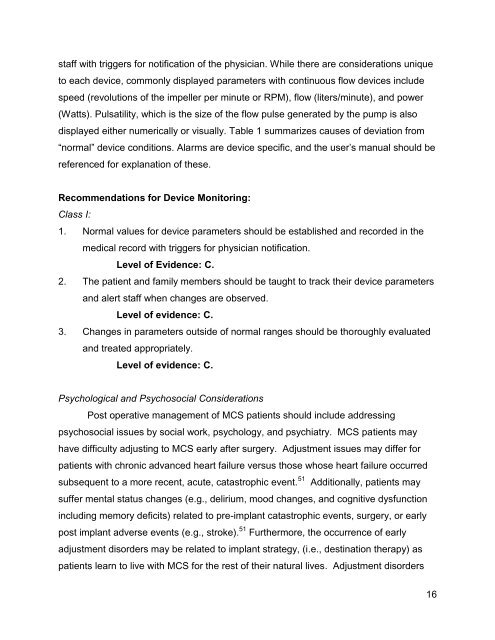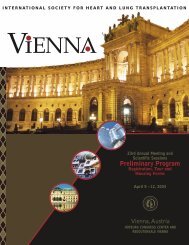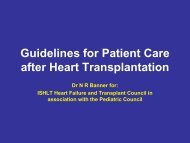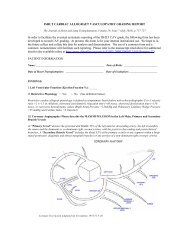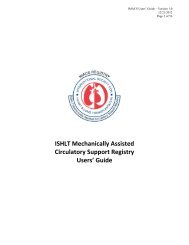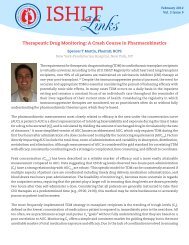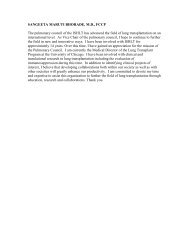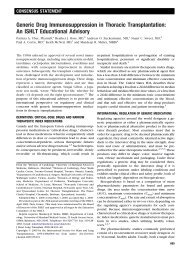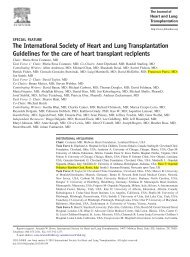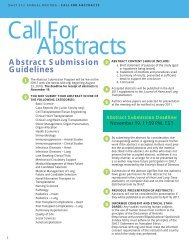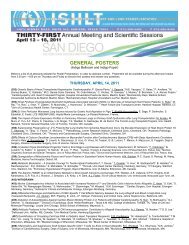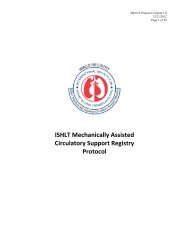Task Force 4: Inpatient Management of Patients with MCSD - The ...
Task Force 4: Inpatient Management of Patients with MCSD - The ...
Task Force 4: Inpatient Management of Patients with MCSD - The ...
You also want an ePaper? Increase the reach of your titles
YUMPU automatically turns print PDFs into web optimized ePapers that Google loves.
staff <strong>with</strong> triggers for notification <strong>of</strong> the physician. While there are considerations unique<br />
to each device, commonly displayed parameters <strong>with</strong> continuous flow devices include<br />
speed (revolutions <strong>of</strong> the impeller per minute or RPM), flow (liters/minute), and power<br />
(Watts). Pulsatility, which is the size <strong>of</strong> the flow pulse generated by the pump is also<br />
displayed either numerically or visually. Table 1 summarizes causes <strong>of</strong> deviation from<br />
“normal” device conditions. Alarms are device specific, and the user’s manual should be<br />
referenced for explanation <strong>of</strong> these.<br />
Recommendations for Device Monitoring:<br />
Class I:<br />
1. Normal values for device parameters should be established and recorded in the<br />
medical record <strong>with</strong> triggers for physician notification.<br />
Level <strong>of</strong> Evidence: C.<br />
2. <strong>The</strong> patient and family members should be taught to track their device parameters<br />
and alert staff when changes are observed.<br />
Level <strong>of</strong> evidence: C.<br />
3. Changes in parameters outside <strong>of</strong> normal ranges should be thoroughly evaluated<br />
and treated appropriately.<br />
Level <strong>of</strong> evidence: C.<br />
Psychological and Psychosocial Considerations<br />
Post operative management <strong>of</strong> MCS patients should include addressing<br />
psychosocial issues by social work, psychology, and psychiatry. MCS patients may<br />
have difficulty adjusting to MCS early after surgery. Adjustment issues may differ for<br />
patients <strong>with</strong> chronic advanced heart failure versus those whose heart failure occurred<br />
subsequent to a more recent, acute, catastrophic event. 51 Additionally, patients may<br />
suffer mental status changes (e.g., delirium, mood changes, and cognitive dysfunction<br />
including memory deficits) related to pre-implant catastrophic events, surgery, or early<br />
post implant adverse events (e.g., stroke). 51 Furthermore, the occurrence <strong>of</strong> early<br />
adjustment disorders may be related to implant strategy, (i.e., destination therapy) as<br />
patients learn to live <strong>with</strong> MCS for the rest <strong>of</strong> their natural lives. Adjustment disorders<br />
16


